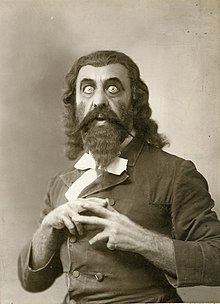Svengali
This article has multiple issues. Please help improve it or discuss these issues on the talk page. (Learn how and when to remove these messages)
|

Svengali (/svɛŋˈɡɑːli/) is a character in the novel Trilby which was first published in 1894 by George du Maurier. Svengali is a Jewish man who seduces, dominates and exploits Trilby, a young half-Irish girl, and makes her into a famous singer.[1]
Definition
[edit]After the book's publication in 1894, the word "svengali" has come to refer to a person who, with evil intent, dominates, manipulates and controls another.
In court, the Svengali Defence is a legal tactic that portrays the defendant as a pawn in the scheme of a greater, and more influential, criminal mastermind.[2]
Novel
[edit]
Svengali is a stereotypical antisemitic portrayal of an Ashkenazic (Eastern European) Jew, complete with "bold, black, beady Jew's eyes" and a "hoarse, rasping, nasal, throaty rook's caw, his big yellow teeth baring themselves in a mongrel canine snarl". He is continually filthy and yet still "clean enough to suit (his own) kind".[3][4] George Orwell wrote that Svengali, who while cleverer than the Englishmen, is evil, effeminate, and physically repugnant, was "a sinister caricature of the traditional type" and an example of "the prevailing form of antisemitism."[5]
(Svengali) would either fawn or bully, and could be grossly impertinent. He had one kind of cynical humour, which was more offensive than amusing, and always laughed at the wrong thing, at the wrong time, in the wrong place, and his laughter was always derisive, and full of malice.[6]
In the novel, Svengali transforms Trilby into a great singer by using hypnosis. Unable to perform without Svengali's help, Trilby becomes entranced.
Portrayals
[edit]Svengali was almost immediately stripped of his Jewishness in portrayals.[4] Svengali was first portrayed by the English actor Herbert Beerbohm Tree in London and by the actor Wilton Lackaye in the United States in the stage play of 1895, Trilby. The story has also been used in several movies.
The character was portrayed in the following films which were all titled Svengali: first by Ferdinand Bonn in the silent film of 1914,[7] then by Paul Wegener in the silent film of 1927, by John Barrymore in 1931, by Donald Wolfit in 1954 (in Technicolor), and by Peter O'Toole in the film of 1983, which was a modernised version made for television and co-starred Jodie Foster. In the movie of March 1983 however, the names of the characters were changed.
The character "Levi Svengali" was portrayed by actor and director Ash Avildsen in the television series Paradise City released by Amazon Prime Video in March 2021.[8]
References
[edit]- ^ Rosenberg, Edgar (1960). From Shylock to Svengali: Jewish Stereotypes in English Fiction. Stanford University Press.
- ^ Seelymarch, Katharine Q. (13 March 2015). "Defense in Marathon Bombing Has Echo of Clarence Darrow". The New York Times. Retrieved 26 June 2016.
- ^ "The Project Gutenberg eBook of Trilby, by George du Maurier". Project Gutenberg. Retrieved 17 May 2022.
- ^ a b Wald, Gayle (26 September 2011). "How Svengali Lost His Jewish Accent". Sounding Out!. Retrieved 17 May 2022.
- ^ Orwell, George (2000). George Orwell: The Collected Essays, Journalism and Letters. An age like this, 1920–1940. David R. Godine Publisher. ISBN 978-1-56792-136-6.
- ^ Du Maurier, George. Trilby. Harper's New Monthly Magazine. Volume 88, number 525. February 1894. (https://books.google.com/books?id=F2EwAQAAMAAJ&pg=PA329#v=onepage&q&f=false p. 329).
- ^ ""Svengali" mit Ferdinand Bonn in der Titelrolle". Neue Freie Presse. 3 April 1914. p. 22. Retrieved 8 January 2022.
- ^ Schafer, Juli (9 September 2020). "Paradise City Found". Television Academy. Archived from the original on 22 October 2022.
External links
[edit]- du Maurier, George (1894). Trilby. Vol. 1. London, England: Osgood, McIlvaine & Co. OCLC 6326099. OL 14046193M. Retrieved 22 October 2022; vol. 2; vol. 3.
- Mayo, Archie (director) (1931). Svengali. Warner Bros. Pictures. Retrieved 22 October 2022.
